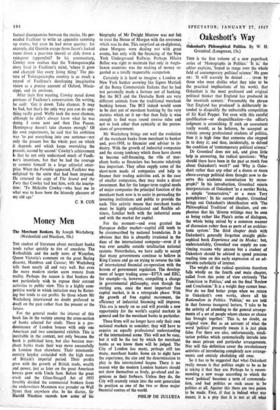Money Men
THE student of literature about merchant banks tends rather quickly to tire of anecdote. The Rothschilds and the early news of Waterloo, Queen Victoria's comment on the great Baring disaster, Hambros and Cavour; Mr Wechsberg tells them nearly all and very well. But even the more modern stories seem remote from reality. Perhaps the reason is that bankers do not particularly wish to expose their current activities to public view. This is a highly com- petitive world in which imitation may be flatter- ing but tends to cut profits. So those whom Mr Wechsberg interviewed no doubt preferred to dwell on the past rather than the present or the future.
For the general reader the interest of this book lies in the variety among the cross-section of banks selected for study. There is a pre- dominance of London houses with only one American and two continental exhibits. This is inevitable in the context, not only because the book is published here, but also because mer- chant banks made their way more successfully in London than elsewhere. Their nineteenth- century heyday coincided with the high noon of Britain's imperial period. Their profits grew with the growth of British trade, wealth and power, just as later on the great American houses grew with Uncle Sam. Before the great crash and the Glass-Steagall Act of 1933 forcibly divided the commercial bankers from the underwriters Mammon was prouder on Wall Street than anywhere else. In his diaries, Sir Harold NicoLson records how some of his biography of Mr Dwight Morrow was not felt to treat the House of Morgan with the reverence which was its due. This surprised an ex-diplomat, since Morgans were dealing not with great events, but only with the financing of the New York Underground Railway. Perhaps Hilaire Belloc was right to maintain that only in Anglo- Saxon countries was the making of money re- garded as a totally respectable occupation.
Certainly it is hard to imagine a London or New York banker avowing like Signor Mattioli of the Banca Commerciale Italiana that he had not personally made a fortune out of banking. But the BCI and the Deutsche Bank are very different animals from the traditional merchant banking houses. The BCI indeed would seem to be shut out of merchant banking by the very statutes which set it up—but then Italy is wise enough to find ways round unwise rules and not to look other than cynically at the preten- sions of government.
Mr Wechsberg brings out well the evolution of the merchant banks from merchant to banker and, post-1918, to financier and adviser to in- dustry. With the growth of industrial companies and the strong tendency which these have shown to become self-financing, the role of mer- chant banks as financiers has become relatively less important. They often supply some of the short-term needs of companies and help to finance their trading activities and, in the case of smaller companies, they may make a direct investment. But for the longer-term capital needs of major companies the principal function of the merchant bank now is to assist in persuading the investing institutions and public to provide the cash. This activity means that merchant banks must be highly sophisticated and flexible ad- visers, familiar both with the industrial scene and with the market for capital.
For the moment—and even granted the European dollar market—capital still tends to be circumscribed by national boundaries. It is obvious that this is absurdly irrational in the days of the international company—even if it was ever sensible outside totalitarian national systems. Nevertheless, we have sadly to accept that many governments continue to believe in King Canute and go on trying to reverse the tide of international financial co-operation with the broom of government regulation. The develop- ment of larger trading areas—EFTA and EEC, for example—is, however, compelling a change in governmental philosophy, even though the sterling area, once the most important free capital market, is in a retrograde phase. With the growth of free capital movement, the efficiency of industrial financing will improve. This era is nearly on us and will provide a new opportunity for the world's capital markets in general and for the merchant banks in particular.
These firms will no longer have only their own national markets to consider; they will have to acquire an equally professional understanding of the international scene. This will not be easy, but it will be the test by which the merchant banks as we know them will be judged. The City of London has many, perhaps still too many, merchant banks. Some six to eight have the experience, the size and the determination to play in this international league. There is no reason why the modern London bankers should not show themselves as lively, go-ahead and in- genious as their forbears. Unless they do, the City will scarcely retain into the next generation its position as one of the two or three major financial centres of the world.
PHILIP DE ZULUETA


































 Previous page
Previous page